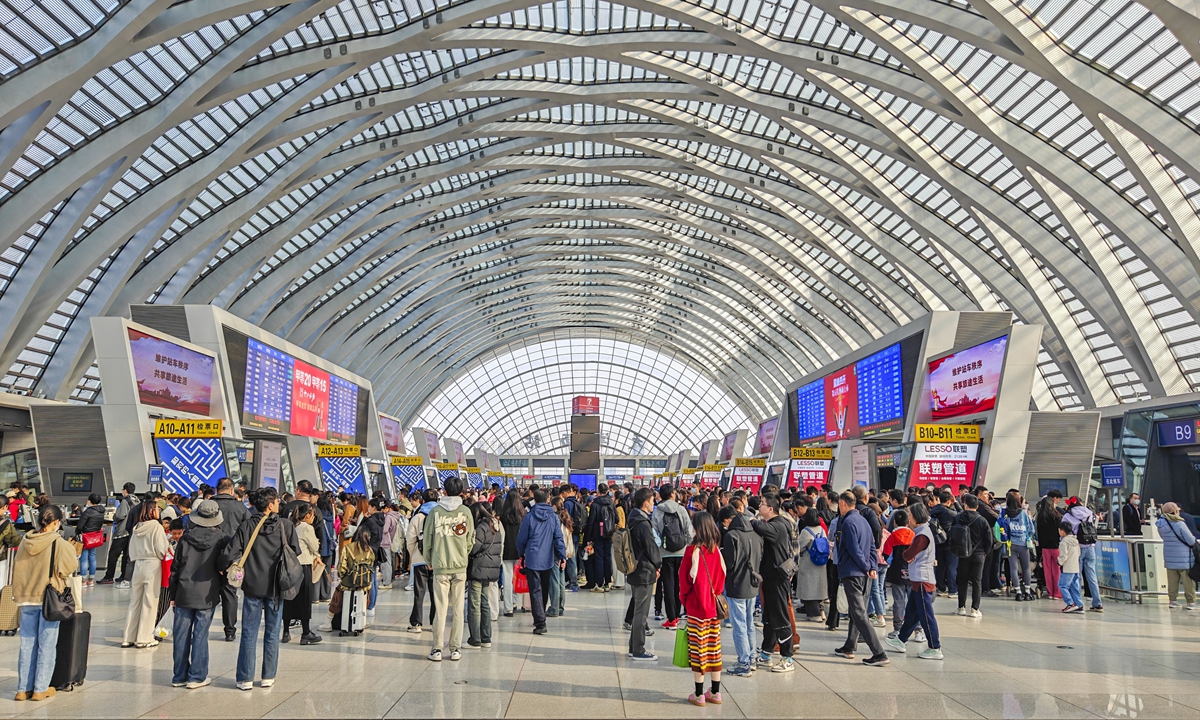
On April 4, 2024, the first day of the Qingming holiday, Tianjin West Railway Station bustling with travelers.(Photo: IC)
Flower appreciation, family outings and cultural activities characterize the feeling around this year’s three-day Qingming Festival holidays, starting from Thursday. The tourism surge during this year’s holidays is far above that of the same period in previous years, as revealed by statistics from several travel platforms. Travel bookings on some travel platforms have reportedly doubled on a yearly basis.
Passenger flows started to peak from Wednesday evening and lasted until Thursday morning. On Thursday, ticket bookings in popular domestic cities increased 1.3-fold year-on-year, and hotel bookings in popular cities nearly doubled year-on-year, according to statistics from Qunar, a Chinese online travel agency.
Many tourists kicked off the holiday with short-distance train journeys. Among the top 20 routes with the greatest number of candidates waiting for available tickets, 18 depart from Beijing, Shanghai, and South China’s Guangzhou and Shenzhen to neighboring cities.
Railways across the country are expected to facilitate 17.5 million passenger trips on Thursday. The railway network across the Yangtze River Delta is expected to facilitate nearly 3.6 million passenger trips on Thursday, up 12 percent from the same period in 2019, China Railway announced on Thursday.
More than half of the passengers traveling by train chose cities that can be reached within a two-hour high-speed rail trip. Popular destinations by train in northern China included Beijing, Xi’an, Tianjin, Jinan and Qingdao.
In response to the near-record spring travel peak, local rail authorities launched "flower appreciation trains" on popular lines to further meet passenger demand.
According to a recent report released by domestic travel platform Trip.com, bookings for flower-viewing spots during the Qingming Festival holidays had risen more than sixfold year-on-year.
A Beijing resident surnamed Li was among the tourists who decided to engage in a flower sightseeing journey during the Qingming Festival holidays.
Li drove to the Juyongguan section of the Great Wall in Beijing to enjoy the scenery on Thursday. Li told the Global Times that he was stuck outside the parking lot for nearly two hours, as there was no spare across four different car parks.
“The queue of cars waiting for parking spaces stretched all the way to the expressway,” Li said, adding that he was appealed by photos published on social media platforms showing suburban trains passing through a sea of flowers.
Li also noted that he failed to book train tickets and was forced to stay in Beijing during the holidays.
“Because the Qingming Festival holiday is a short one, tourists tend to choose destinations that can be reached within a 2-hour high-speed rail ride or a 2-hour car ride, which allows some small towns to catch tourists,” said Xiao Peng, a research fellow at Qunar's Big Data Research Institute.
Industry data showed that during the Qingming Festival holidays in 2024, domestic car rental orders increased by 240 percent year-on-year. Of these, 82 percent of the orders were leased for less than three days.
Some cities combined flower appreciation with the cultural activities celebrated as part of the Huazhao Festival, a traditional flower festival, during the holidays. Huazhao Festival is held in celebration of the flower goddess’ birthday in the second month of lunar calendar.
For example, the celebration for the Huazhao Festival started in late March in Jinan and will run until May 6. Traditional market and poetry cultural activities have boosted the popularity of the city of Jinan.
Outside of domestic tourists, inbound travel is also surging, with a shortage of foreign language tour guides. The daily cost of hiring a tour guide has jumped to above 1,000 yuan ($138) for some languages such as Russian. Currently, English-speaking tour guides earn between 400 and 600 yuan a day, according to media reports.




